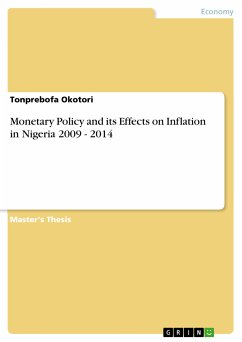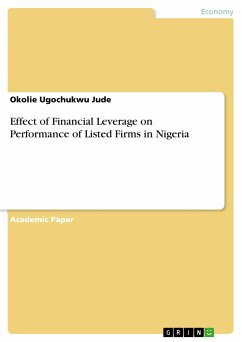Research Paper (undergraduate) from the year 2019 in the subject Business economics - Banking, Stock Exchanges, Insurance, Accounting, grade: 4.60, , course: Banking and Finance, language: English, abstract: The objectives of this study includes to examine the effects of banking sector reforms on bank performance, savings, investments, developments of the Nigerian Banking System and Economic Growth. The banking sector is without no doubt a very essential part of the economy of a nation and any reforms carried out in it extend to other parts of the economy representing a transformational moment for the economy and its people. So it remains a nationwide challenge that the Nigerian banking sector and it's reforms haven't been able to significantly support the long-term financial needs of the real sector or facilitate the growth of the Nigerian economy The Augmented Dickey-Fuller (ADF) Test and The Phillip-Perron Test were used to test for stationarity of the variables, while the Johansen co-integration test was employed to indicate the existence of a long-run relationship among Gross Domestic Product-which acted as the Economic Growth proxy, Commercial Bank's Capital, Commercial Bank's Credit, and Number of Commercial Bank Branches which acted as the other variables. Secondary data was sourced from Commercial Bank Statistics, Central Bank Of Nigeria Bulletins, Nigeria Bureau Of Statistics, Statistical Bulletins for the period of 1998-2017. Conclusively, there was a positive and significant relationship betweenEconomic Growth and Banking Sector Reforms in the long run, but a negative relationship between Economic Growth and Financial Sector Reforms in the short-run. It was recommended that the government should ensure political and macroeconomic stability as the activities in all other sectors are affected by them, and that people are enlightened on the benefits of banking sector reforms so that they don't take opposing actions against the goal of reforms.
Dieser Download kann aus rechtlichen Gründen nur mit Rechnungsadresse in A, B, BG, CY, CZ, D, DK, EW, E, FIN, F, GR, HR, H, IRL, I, LT, L, LR, M, NL, PL, P, R, S, SLO, SK ausgeliefert werden.
Hinweis: Dieser Artikel kann nur an eine deutsche Lieferadresse ausgeliefert werden.









